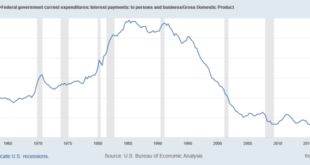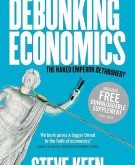If you want evidence that #Albanese will never change, check out his response to a Dorothy Dixer asking whether “ea parliament dominated by progressive political forces provided structural opportunity in the event the government pursued additional legislative measure” on renewables. Rather than saying “Yes, we will work with the Parliament” #Albo went straight on attack against the Greens, for forcing him to strengthen his pathetic Housing Fund. He’s a hopeless case. #auspol...
Read More »A high national debt can be bad news, sort of like a high stock market
from Dean Baker The media have been giving considerable attention to the national debt in the last year or so. They have some cause, it has been rising rapidly, and more importantly, the interest burden of the debt has increased sharply since the Fed began raising rates last year. But, if we want to be serious, rather than just write scary headlines, we have to ask why the debt is a problem. The first concern to dispel is the idea that the country somehow has to pay off its debt. Our...
Read More »The difference between a philosopher and a common street porter
from Adam Smith The difference of natural talents in different men is, in reality, much less than we are aware of; and the very different genius which appears to distinguish men of different professions, when grown up to maturity, is not upon many occasions so much the cause as the effect of the division of labour. The difference between the most dissimilar characters, between a philosopher [economist] and a common street porter, for example, seems to arise not so much from nature as...
Read More »Comment problems
It looks as if something has gone skew-whiff with the comment box. I’ll look into it, but it may take me a while. For the moment, if you can’t get WordPress to record your name, just comment anonymously and add your name in the body. I’ll check and approve regularly. Share this:Like this:Like Loading...
Read More »Risk vs. Uncertainty
from Steve Keen The key concept in Keynes’s summary was the impact of expectations upon investment, when those expectations were about what might happen in an uncertain future. Investment is undertaken to augment wealth, and yet the outcome of any investment depends upon economic circumstances in the relatively distant future. Since the future cannot be known, investment is necessarily undertaken on the basis of expectations formed under uncertainty. Keynes was at pains to distinguish...
Read More »The Adventures of Economic Policy within Mainstream Economics – S.Mavroudeas, SUFE Shanghai 23/9/2023
SUFE (the Shanghai University of Economics and Finance) organised at Dishoui Lake an one-day conference on issues concerning the Chinese modernisation. I participate in this conference as an invited speaker and presented a paper analysing ‘The Adventures of Economic Policy within Mainstream Economics‘.
Read More »The causal revolution in econometrics has gone too far
from Lars Syll Kevin Lewis points us to this recent paper, “Can invasive species lead to sedentary behavior? The time use and obesity impacts of a forest-attacking pest,” published in Elsevier’s Journal of Environmental Economics and Management, which has the following abstract: “Invasive species can significantly disrupt environmental quality and flows of ecosystem services and we are still learning about their multidimensional impacts to economic outcomes of interest. In this work, I...
Read More »Balance or both-sidesism
It’s time for me to have my final say on a dispute with Matt Yglesias that has been going at a fairly slow pace. A couple of weeks ago, Matt put up a post (really a Substack newsletter, but I still think in blog terms), headlined Polarization is a choice with the subtitle, “Political elites justify polarizing decisions with self-fulfilling prophesies” I responded with a snarky but (I thought) self-explanatory note, saying “Peak both sidesism here. Republicans want to overthrow US...
Read More »Whatever happened to NFTs?
A few years back, my chairman was a big enthusiast of NFTs (nonfungible tokens). In one conversation I recall, I pointed to a picture of the founding chair of the department and suggested he could digitize it and sell it to alumni as an NFT. He said he thought that was a good idea. When I laughed, he said “I’m not joking.” I replied: “That’s what I’m afraid of.”NFTs have always been an example of The Greater Fool Theory of investing, which holds that...
Read More »Living in the 70s: why Australia’s dominant model of unemployment and inflation no longer works
I’m looking forward to the release of the government’s Employment White Paper with a mixture of hope and trepidation. The fact that the title was changed from the original “Full Employment” is not encouraging, nor is the general track record of this government. On the other hand, in setting the scene for the release, Treasurer Jim Chalmers has indicated that the government will commit itself to five main objectives sustained and inclusive full employment; job security and strong,...
Read More » Heterodox
Heterodox




